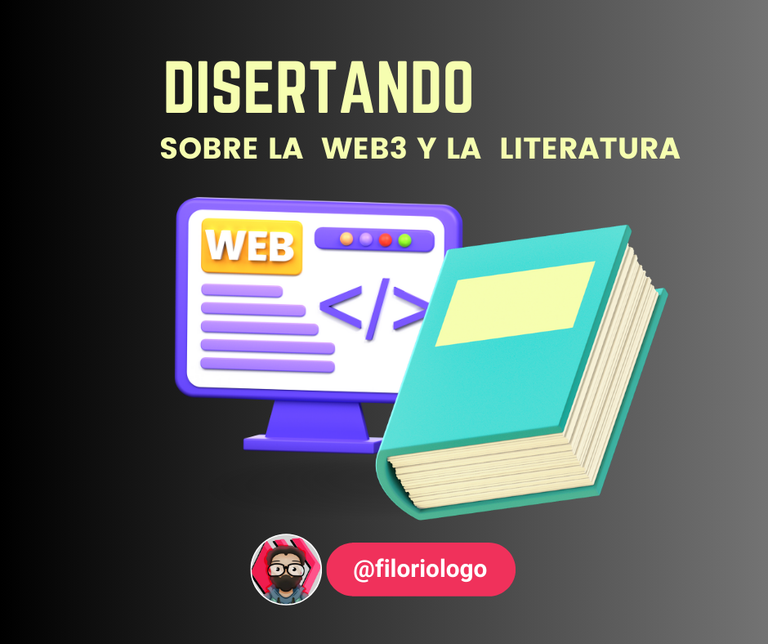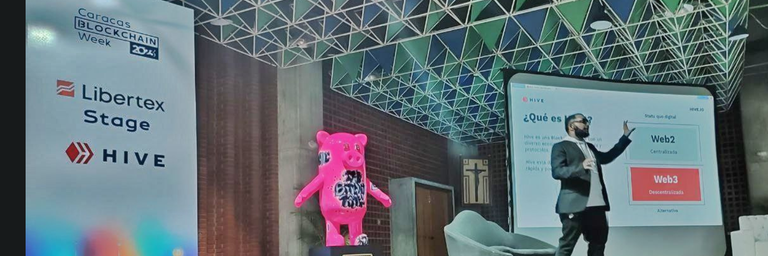
Portada editada con Canva Pro
¿Realmente estamos frente a una Revolución Filosófica en la Era Digital?
Iniciativa: Web3 y la Literatura. Por lo que intentaré aproximarme en este tema que en lo personal me resulta fascinante, pues pienso que la relación entre la Web3 y la literatura tiene tanto desafíos como oportunidades significativas. De modo que podríamos estar frente a una suerte de transformación de no solo la forma en que creamos y consumimos historias, sino también nuestra concepción misma de la cultura literaria.Estimados entusiastas de las criptomonedas y amantes de las letras, bienvenidos a mi blog, un espacio donde intentamos explorar las cosas con un poco de filosofía. Hoy deseo responder a la invitación de la comunidad #humanitas, pues recientemente se publicó su más reciente iniciativa:
Quienes conocemos un poco sobre Web3, sabemos que con su enfoque en la descentralización, la transparencia y la propiedad digital, está redefiniendo industrias enteras. Desde las finanzas hasta el arte, su impacto es indiscutible. Pero... ¿qué pasa con la literatura? ¿Acaso puede la Web3 influir en algo tan profundamente humano como la narrativa y la poesía? Así que intentaré expresarme a modo de opinión en este artículo atendiendo a la invitación a reflexionar sobre cómo la Web3 está reescribiendo las reglas del juego literario y qué implicaciones pueden estar a la vuelta de la esquina.
- Sobre la propiedad digital
Uno de los pilares de la Web3 es la propiedad digital, de eso no hay duda, puesto que gracias a desarrollos como los NFTs (Tokens No Fungibles), los autores pueden asegurar la autenticidad y la propiedad de sus obras de manera inmutable, ya que esta escrito sobre piedra (blockchain), por solo nombrar un aspecto de web3. Esto no solo protege los derechos de autor, sino que también les devuelve el control sobre su creación. Filosóficamente hablando esto nos lleva a la pregunta ¿qué significa ser dueño de una idea? ¿Cómo cambia nuestra relación con la creatividad cuando esta se puede tokenizar y transferir de manera transparente?
La Web3 sin duda empodera a los autores, si no me creen, échenle un vistazo a la blockchain de Hive. Permitiéndoles monetizar y recibir incentivos en criptomonedas por su trabajo, sin depender de intermediarios. Esto no es solo una cuestión económica, sino también ética: es una reivindicación de la autonomía del creador en un mundo digital cada vez más centralizado la web3 existe como alternativa de profundo valor que ofrece el recobrar el poder.
- Sobre los micropagos y la democratización del acceso:
Aunque esto ya lo he mencionado antes, creo que otra revolución que trae la Web3 es la posibilidad de los micropagos. Haz comingo el siguiente ejercicio imaginativo y piensa en un mundo donde puedes pagar centavos por leer un capítulo de un libro, un poema o un ensayo. Esto no solo hace que la literatura sea más accesible, sino que también redefine el valor que le asignamos a las palabras. Ahora que en la DApp de INLEO se ha abierto la posibilidad de tener un canal por suscripción, autores pueden publicar periódicamente capítulos de una obra expresamente para sus lectores.
Desde una perspectiva que me gustaría decir filosófica, los micropagos nos obligan a reflexionar sobre el valor intrínseco de la cultura. Te has preguntado ¿Cuánto vale una historia? o ¿Cómo podemos asegurarnos de que los creadores sean justamente compensados sin excluir a aquellos con menos recursos? Creo que la Web3 está ofreciendo respuestas prácticas a estas preguntas, pero también nos desafía a repensar nuestras prioridades como sociedad.
- Sobre las comunidades descentralizadas
La Web3 fomenta la creación de comunidades descentralizadas, donde autores y lectores interactúan directamente. Esto no solo cambia la dinámica de la creación literaria, sino que también abre la puerta a nuevas formas de narrativas colaborativas, o eso me gusta pensar. Pero, esto nos guía a cuestionar la noción tradicional del "autor".
Como ultimo punto hablemos de la censura:
- Resistencia a la censura y la libertad de expresión:
La censura ha sido y sigue siendo una realidad en muchos lugares y contextos y que la Web3 ofrece una alternativa: plataformas descentralizadas donde las obras no pueden ser eliminadas o bloqueadas. Esto no solo protege la libertad de expresión, sino que también garantiza que las voces marginadas tengan un espacio para ser escuchadas. Sin lugar a dudas web3 es ese lugar donde no se ha extendido los tentáculos del control de la información.
Esto me hace pensar en la importancia de la diversidad de pensamiento y la necesidad de proteger las ideas, sobre todo aquellas que desafían el status quo. La Web3 se convierte así en un bastión de la libertad intelectual en la era digital, o eso es lo que me gusta creer.
Creo que a modo de conclusión me gusta pensar que la Web3 no es solo una evolución digital o virtual, sino que es una revolución filosófica que está transformando la literatura no solo en términos prácticos, sino también en cómo entendemos conceptos como la propiedad, el valor, la autoría y la libertad.
Así que estimado lector, te invito a reflexionar sobre estas ideas y a compartir tus pensamientos, así que no dudes en participar en la iniciativa que acaba de salir. Te has preguntado ¿Cómo crees que la Web3 puede influir en la literatura? Únete a la conversación en la comunidad. Juntos, podemos explorar cómo la tecnología y la filosofía se unen para crear un futuro literario más brillante.
ENGLISH VERSION (click aquí!)
Discussing web3 and literature
Are we really facing a Philosophical Revolution in the Digital Age?
Dear cryptocurrency enthusiasts and literature lovers, welcome to my blog, a space where we try to explore things with a bit of philosophy. Today I want to respond to the invitation of the #humanitas community, as they recently published their most recent initiative: Initiative: Web3 and Literature. So I will try to approach this topic that I personally find fascinating, as I think that the relationship between Web3 and literature has both significant challenges and opportunities. So we could be facing a kind of transformation of not only the way we create and consume stories, but also our very conception of literary culture.
Those of us who know a little about Web3 know that with its focus on decentralization, transparency and digital ownership, it is redefining entire industries. From finance to art, its impact is indisputable. But... But what about literature, can Web3 influence something as deeply human as storytelling and poetry? So I'll try to express an opinion in this article in response to the invitation to reflect on how Web3 is rewriting the rules of the literary game and what implications may be just around the corner.
On digital property
One of the pillars of Web3 is digital property, of that there is no doubt, since thanks to developments such as NFTs (Non Fungible Tokens), authors can ensure the authenticity and ownership of their works in an immutable way, as it is written in stone (blockchain), to name just one aspect of web3. This not only protects authors' rights, but also gives them back control over their creation. Philosophically speaking this begs the question, what does it mean to own an idea? How does our relationship with creativity change when it can be tokenized and transferred transparently?
Web3 undoubtedly empowers authors, if you don't believe me, take a look at Hive's blockchain. Allowing them to monetize and receive cryptocurrency incentives for their work, without relying on intermediaries. This is not only an economic issue, but also an ethical one: it is a vindication of creator autonomy in an increasingly centralized digital world the web3 exists as a deeply valuable alternative that offers reclaiming power.
On micropayments and the democratization of access:
Although I have mentioned this before, I think another revolution Web3 brings is the possibility of micropayments. Do the following imaginative exercise and think of a world where you can pay pennies to read a chapter of a book, a poem or an essay. Not only does this make literature more accessible, but it also redefines the value we place on words. Now that the INLEO DApp has opened up the possibility of having a subscription channel, authors can periodically publish chapters of a work expressly for their readers.
From what I would like to call a philosophical perspective, micropayments force us to reflect on the intrinsic value of culture. Have you ever wondered how much a story is worth, or how can we ensure that creators are fairly compensated without excluding those with fewer resources? I believe Web3 is offering practical answers to these questions, but also challenging us to rethink our priorities as a society.
On decentralized communities
Web3 encourages the creation of decentralized communities, where authors and readers interact directly. This not only changes the dynamics of literary creation, but also opens the door to new forms of collaborative storytelling, or so I like to think. But, this leads us to question the traditional notion of the “author”.
As a last point, let's talk about censorship:
Censorship resistance and freedom of expression:
Censorship has been and continues to be a reality in many places and contexts and that Web3 offers an alternative: decentralized platforms where works cannot be removed or blocked. This not only protects freedom of expression, but also ensures that marginalized voices have a space to be heard. Undoubtedly web3 is that place where the tentacles of information control have not spread.
This makes me think about the importance of diversity of thought and the need to protect ideas, especially those that challenge the status quo. Web3 thus becomes a bastion of intellectual freedom in the digital age, or so I like to believe.
I guess by way of conclusion I like to think that Web3 is not just a digital or virtual evolution, but a philosophical revolution that is transforming literature not only in practical terms, but also in how we understand concepts such as ownership, value, authorship and freedom.
So dear reader, I invite you to reflect on these ideas and share your thoughts, so feel free to participate in the initiative that has just been launched. Have you wondered how you think Web3 can influence literature? Join the conversation in the community. Together, we can explore how technology and philosophy come together to create a brighter literary future.
Translated with DeepL.com (free version)
Si deseas apoyar mi trabajo acá puedes enviar un tip
If you wish to support my work here you can send a tip.
HIVE/HBD: filoriologo
LEO: filoriologo
Bitcoin Lightning Network: [email protected]
Bitcoin: 1Sarz4FYPMDGmEUL8DsAQYHKZSVazAaFk
USDT(TRC20): TFa11YSZ77XPH56XiSqseHLms6LAzjcAkv
BINANCE ID: 4072493

| X | Instagram | Medium |Telegram | LinkedIn | INLEO |
Posted Using INLEO